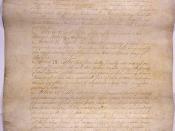Federalism has been one of the most controversial terms in American Government since its creation in 1789. Confusion over the meaning of federalism and disagreement over its implications have not ceased since the debate over the constitution. Federalism, adding to its problematic history has never conformed precisely to any theoretical idea. The definition that we have come to study of federalism is: A political system in which power is divided between the central government and its two component parts- in the United States, between the national government and the states. Exactly how power should be divided, and to resolve disputes over the distribution of power are difficult questions. Because the answers to these questions vary, there are many different forms of federalism. Duel federalism, also known as "layer cake" federalism recognizes that both the state and national governments are supreme within their respective spheres of power. Cooperative or "marble cake" federalism underscores the importance of cooperation between the two levels of government.
Creative federalism called for cooperation between state and national governments, along with the private sector to solve problems like poverty and urban decay. The "New Federalism" under President Nixon moved to shift creative federalism in the direction of state-centered federalism.
Thirteen years after the signing of the Declaration of Independence and eight years after the ratification of the Articles of Confederation, which established a league of sovereign states, the nation repealed the Articles of Confederation and ratified a new constitution creating the United States in 1789. The new constitution established a union of states under a federal system of governance. Two questions have generated considerable debate since the beginning of the constitution: What is the nature of the Union? And, What privileges, power, responsibilities, and duties does the constitution grant to the national government and reserve to the...



Well...
Not the best written essay. It lacks cohesion, as well as references, but it might give you ideas for further research.
0 out of 0 people found this comment useful.